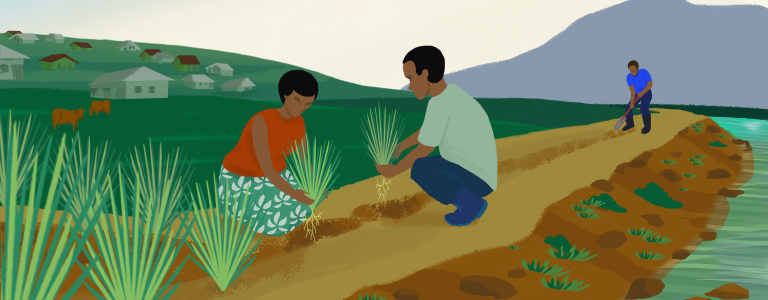Planting for Resilience
Scaling Up the Adoption of Ecosystem-Based Adaptation Using Behaviour-Centred Design: The case of vetiver grass for riverbank erosion control in Fiji
Planting for Resilience is a research initiative that explores how to incentivize the adoption of climate adaptation solutions and the implications for developing and implementing climate policies that are informed by behavourial science.
Adapting to climate change requires shifts at the individual, organizational, and collective levels—from what we eat, how we consume, and how we commute to how we manage our ecosystems, and much more. However, the role of behaviour change in the field of climate adaptation has largely been overlooked and oversimplified. The latest science on behavioural change reveals that knowing and caring about an issue does not automatically drive behavioural change. This means that, in addition to securing funding and raising key stakeholders’ awareness of the socio-economic and environmental value of climate adaptation solutions, more attention is needed to addressing behavioural barriers at individual and collective levels.
This initiative focuses on one approach that responds to climate change impacts and risks: Ecosystem-based Adaptation (EbA). EbA includes protecting, restoring, and enhancing ecosystem services while improving the resilience of communities and livelihoods. Through this initiative, we explore a specific case of EbA: the adoption of vetiver grass for riverbank rehabilitation to reduce flood damage in Fiji.
The initiative brings together climate adaptation specialists from IISD, behaviour science experts from Rare (the Center for Behavior and the Environment), and policy- and decision-makers from the Fijian Ministry of Waterways and the Ministry of Economy’s Climate Change Division.
The Planting for Resilience project is made possible with the financial support of the Global EbA Fund.
You might also be interested in
How Fiji Is Using the National Adaptation Plan (NAP) Process to Scale Up Ecosystem-Based Adaptation (EbA)
Fiji is using its national adaptation planning efforts to scale up and make Ecosystem-based Adaptation (EbA) a strategic priority.
Solutions in Nature: Lessons from Fiji and Timor-Leste
Many countries are already using ecosystem-based adaptation to help build resilience to the impacts of climate change. In order to maximize its uptake and benefits, it is critical to integrate these actions into a country’s National Adaptation Plan (NAP) process.
Climate Adaptation and Protected Areas Initiative
A new initiative will use nature-based solutions to support local communities in adapting to climate change while safeguarding critical ecosystems in and around protected areas.
Nature for Climate Adaptation Initiative
A new initiative aims to support nature-based climate action that protects livelihoods and biodiversity in the most vulnerable parts of the world.



